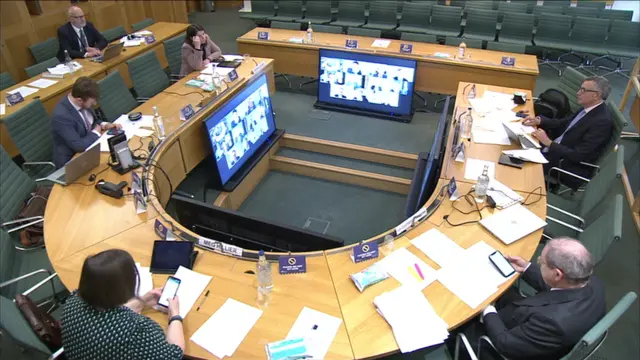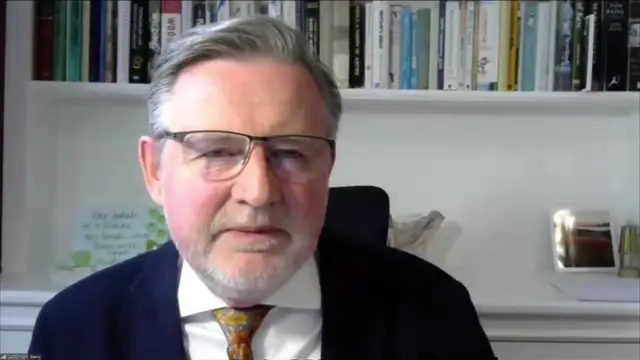Goodbyepublished at 18:58 BST 13 May 2021
Thank you for joining us for today's hearings. We're going to close the live page now, but please keep following all the reaction and latest updates on the BBC News website and the BBC News Channel.
David Cameron has appeared in front of two committees of MPs over his involvement with Greensill Capital
He told the Public Accounts Committee he once thought the now defunct firm could be a UK "success story"
The former PM added that he was not approached about working for it while in office
Cameron gave evidence earlier to the Treasury Committee, which is also holding an inquiry
MPs asked him about his work as an adviser for Greensill, which included texting current ministers
Cameron said there had been "absolutely no wrongdoing" on his part
He also revealed he had been paid "a generous amount" at Greensill - "far more than" his £150,402 salary as PM
Alex Kleiderman, Richard Morris and Mary O'Connor
Thank you for joining us for today's hearings. We're going to close the live page now, but please keep following all the reaction and latest updates on the BBC News website and the BBC News Channel.
David Cameron's had a busy day in front of MPs. Here are the key points:
Public Accounts Committee chair Meg Hillier asks how David Cameron would like to be remembered.
The former PM says he put together the first coalition in 70 years against the background of a "very tricky" economic situation.
"Do you regret the past few months?" asks Ms Hillier.
"Well obviously it's been difficult for me," he replies, but he says he feels more sorry for people who worked at Greensill Capital and lost their jobs.
"There'll be lessons to learn. I'll be reading your committee report and the Treasury Committee's report," he says.
With that, the committee session closes.
Tory MP Sir Bernard Jenkin asks David Cameron what lessons the Public Accounts Committee should draw from this episode.
Cameron replies that there's "always work to be done" on managing conflicts, transparency and the rules for what people do when they leave office.
He cautions that, in doing this, the ability to access "private sector skills" and for there to be "dialogue" between the public and private sectors should not be lost.
Conservative Sir Geoffrey Clifton-Brown asks if, with hindsight, David Cameron should have been more aware of the financial difficulties facing Greensill Capital.
Cameron says he did not believe the company was in "any severe financial difficulty" in March and April 2020. He says founder Lex Greensill said himself that the company was only in difficulty in December 2020.
Cameron adds that when he joined the company, he asked lots of questions and "sought all kinds of answers" about how it was operating.
Committee chair Meg Hillier asks if David Cameron has disclosed all his contacts with government.
Cameron says he has, but he would go away and double check them.
Hillier, a Labour MP, asks how Greensill Capital, under its scheme, could afford to pay NHS staff early for no fee.
Cameron says it wasn't an advance by Greensill, but the scheme was at a cost to the company. But he says the cost was "relatively low", especially as the NHS was going to continue paying staff.
Hillier asks if Cameron was aware senior civil servant Bill Crothers had taken a role on with Greensill while still working in government.
Cameron says he was "surprised", and was not aware.
Tory MP Shaun Bailey focuses on the government's use of people working in the private sector.
David Cameron says: "Whenever you try to involve private-sector skills in the public sector and those people are maintaining private-sector roles there will always be difficulties."
He adds that there are inevitably questions about potential conflicts of interest.
But he adds: "We don't want a sort of Berlin Wall between the public and private sectors...Transparency is the key thing here."
Cameron points out the ministerial code was "beefed up" during his time in office, but accepts more could still be done.
Richard Holden follows up, arguing that, although early payments "would have a cost" to the Treasury, it would be "pretty small".
He adds that the "bigger cost" would have been the fact that pharmacies would have to factor in they would get less money, and would therefore charge more or push for higher prices for their products - so the "real cost is to the taxpayer at the end of the day anyway".
Cameron says although he is not "the world-leading expert on this" he disagrees with Holden's assessment.
"If you've not got a good working capital solution, you have to go to the bank and borrow money, and that is going to be more expensive than the cash, less the discount, that you're getting from the supply chain finance provider".
He argues this is one of the "key points to this whole argument".
Conservative Richard Holden asks Cameron why he could not just "sort out the bureaucracy" within the NHS, rather than bringing in a new financial product.
"Surely that would have been the most sensible thing to have done," he adds.
Cameron replies that "of course" that would have been a "sensible" thing to do, but there were several "barriers".
He says bureaucracy was the first, that businesses would talk about the red tape they had faced in dealing with the NHS - but he adds that an element of bureaucracy is "understandable", given public money is involved.
The second point, he says, is that "there can be some resistance in the Treasury" due to early payment having a "cost to them".
He argues the third element is, in the case of NHS pharmacies, that "they weren't being paid early, they were being paid before drugs were dispensed on the basis of being able to predict via an algorithm what the prescription history was", and therefore that was "a risk that government wouldn't want to take".
 Image source, HoC
Image source, HoCLib Dem MP Sarah Olney asks about a financial product for pharmacists that was promoted by one of Lex Greensill's company's during Cameron's time as prime minister.
The Pharmacy Early Payment Scheme saw banks reimburse pharmacists for providing NHS prescriptions, for a fee, before recovering the money from the government.
Greensill Capital went on to provide funds for the scheme.
But asked if there was a conflict of interest, Cameron says the contract was secured in a competitive tender after Greensill had left his government role.
"His firm didn't take over this contract for over six years... It seems to be an unfair argument," he says, adding it was as if "I benefited from organising your marriage six years ago because today I have married your ex-partner".
"OK, I think I understand," replies Olney.
 Reality Check
Reality Check
For the second time today David Cameron is answering questions about his work for the collapsed finance company Greensill Capital.
MPs, sitting on two committees, are investigating the way he lobbied ministers and former colleagues, which involved emails, texts and WhatsApp messages.
Cameron said he has not broken any rules, but he admitted he should have used "only the most formal" means to lobby.
For more, read our simple explainer.
Conservative Sir Bernard Jenkin says the "question" of a "revolving door" between public-sector and business jobs is "of concern".
He asks what message his appointment by Greensill sent out to officials and ministers who were dealing with the firm at the time.
Cameron says that he does "understand the concern", but there's an appointments process, and after you leave office it can be acceptable to take up a commercial role.
Sir Bernard asks "how appropriate it is" for people to be dealing with companies they subsequently seek employment with.
Cameron asks if someone works in the Treasury, should that exclude them from working in banking for 20 years? He says he believes reform of lobbying is right, but "you have to be careful that what you do doesn't make it impossible".

Next up is Peter Grant of the SNP, who asks David Cameron why he specifically wanted to work for Greensill, just one of "a number of organisations who might have been quite keen to recruit you".
Cameron says he met Lex Greensill after he left office and that Greensill told him about "the business he had created and was growing".
The former PM says in additional to his pro bono charitable work he was looking to do some business work.
He says: "What I thought was interesting about Greensill was... going to big businesses and saying let us pay your supply chains immediately and then you pay us after 60 or 90 days and in the meantime we raise the money on the capital markets".
He says he liked that this approach was "helping small businesses with cash flow", and that to him, it was "taking one thing that banks have done, and not always done well, and trying to make it better, cheaper, faster, digital, paperless".
Mr Cameron says Greensill was a "UK fintech potential success story" and that was what he thought was "interesting" about the firm.
He adds that he thought about it for a long time and did some "due diligence" before joining.
 Image source, HoC
Image source, HoCThere has been much focus on how Greensill Capital's boss, Lex Greensill, came to work for the government as an unpaid adviser during David Cameron's tenure as prime minister.
"How did it all come about?" Labour's Barry Gardiner asks.
Cameron says Greensill was brought in by then Civil Service head Sir Jeremy Heywood who was keen to use outside consultants.
"I'm sure I was informed he was coming... but have not yet seen a paper trail for that," he tells the committee.
But Cameron denies his relationship with Greensill became "blurred" during his time in office, saying he had very little contact with him.
Conservative MP Sir Geoffrey Clifton-Brown asks if the Treasury was "pessimistic" about supply chain finance schemes. He says they mean the government ends up having to pay both the bill and interest.
Cameron says NHS pharmacies were being paid immediately by Greensill, and Greensill was being paid by the NHS later, and therefore the Treasury was not directly involved.
Cameron says some people think such schemes were "pointless," but they have made a real difference to pharmacists.
 Reality Check
Reality Check
David Cameron is speaking about government schemes to get money to small businesses.
Greensill Capital was involved in a scheme to make sure companies were paid by government departments on time - what's known as supply chain finance.
But what is it and how does it work?
One of the key problems in business, especially for smaller companies, is delays in other companies paying you for your goods or services.
The idea of supply chain finance is that a third company comes in and lends you the money straight away, charging a fee for the service.
When your customer pays the bill, that money goes to the lender to pay off the debt.
David Cameron was very enthusiastic about this in government and it was one of the things that Greensill Capital was involved with, external.
But there are concerns that this relatively simple process was made more complicated by some of the companies using it and that it may have hidden some of the cash-flow and debt problems that their customers were having.
Conservative Sir Geoffrey Clifton-Brown asks at what point he became aware of the use of supply chain finance in the public sector.
Cameron says the late Cabinet Secretary Sir Jeremy (later Lord) Heywood was responsible for bringing it into government in 2011.
The Public Accounts Committee's hearing is on rather technical issues.
We'll remind you of what supply chain finance is in a bit.
The chair of the Public Accounts Committee, Meg Hillier, opens the second Q&A session of the day for David Cameron.
She says she hopes the session will only last about an hour. The previous one, with the Treasury Committee, was rather longer.
 Jonathan Blake
Jonathan Blake
BBC political correspondent
There was some Mrs Merton style questioning from certain MPs - “Do you not feel you have demeaned yourself and your position by WhatsApping your way around Whitehall?
It made for compelling and sometimes cringe-worthy viewing.
There were moments of drama in this afternoon's session, but no big reveal.
Will members of the Public Accounts Committee extract any new information or admissions from Mr Cameron? We'll see.